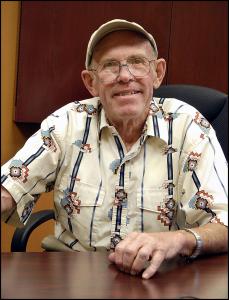Wayne Whalen

The Working Waterfront Festival Community Documentation Project
This project documents the history and culture of the commercial fishing industry and other port trades. The project began in 2004 in conjunction with the Working Waterfront Festival, an annual, educational celebration of commercial fishing culture which takes place in New Bedford, MA. Interviewees have included a wide range of individuals connected to the commercial fishing industry and/or other aspects of the port through work or familial ties. While the majority of interviewees are from the port of New Bedford, the project has also documented numerous individuals from other ports around the country. Folklorist and Festival Director Laura Orleans and Community Scholar and Associate Director Kirsten Bendiksen are project leaders. The original recordings reside at the National Council for the Traditional Arts in Maryland with listening copies housed at the Festival's New Bedford office.
Wayne Whalen is a seasoned professional in the fishing industry, with a lifelong involvement that spans various roles including fisherman, lumper, and machinist. Born in Philadelphia, PA, Whalen currently resides in Cape May, NJ, where he operates a metal fabricating business. His connection to the fishing industry was established through his family, particularly his cousins who were commercial fishermen. Whalen's work has often intersected with the fishing industry, as he has frequently contributed his metalwork skills to the maintenance and repair of commercial boats. In addition to his business, Whalen has also volunteered on the restoration of the F/V Roann, a wooden Eastern Rig, for the past eight years.
Scope and Content Note
This interview with Wayne Whalen conducted by Markham Starr on September 28, 2013, provides an insightful look into Whalen's extensive experience in the fishing industry. Whalen discusses his personal history, including his family's involvement in the industry and his own work as a machinist and volunteer on the F/V Roann. He also shares his observations on the evolution of the industry from the 1950s to the present, particularly noting the technological advancements and the transition from wood to steel and Eastern Rigs to stern trawlers. Whalen also discusses the future of the fishing industry, mentioning the diversification of businesses into areas like windmill technology and the global clam processing industry. He emphasizes the importance of local employment and the economic impact of the fishing industry on local communities. Towards the end of the interview, Whalen shares his views on the new rules and regulations in the industry, advocating for decision-makers to gain firsthand experience on fishing boats to make informed decisions. The interview concludes with Whalen expressing his satisfaction with the progress of the F/V Roann restoration project.
Please Note: The oral histories in this collection are protected by copyright and have been created for educational, research and personal use as described by the Fair Use Doctrine in the U.S. Copyright law. Please reach out Voices@noaa.gov to let us know how these interviews are being used in your research, project, exhibit, etc. The Voices staff can help provide other useful resources related to your inquiry.
The NOAA mission is to understand and predict changes in climate, weather, oceans, and coasts, to share that knowledge and information with others, and to conserve and manage coastal and marine ecosystems and resources. The Voices Oral History Archives offers public access to a wide range of accounts, including historical materials that are products of their particular times, and may contain offensive language or negative stereotypes.
Voices Oral History Archives does not verify the accuracy of materials submitted to us. The opinions expressed in the interviews are those of the interviewee only. The interviews here have been made available to the public only after the interviewer has confirmed that they have obtained consent.
